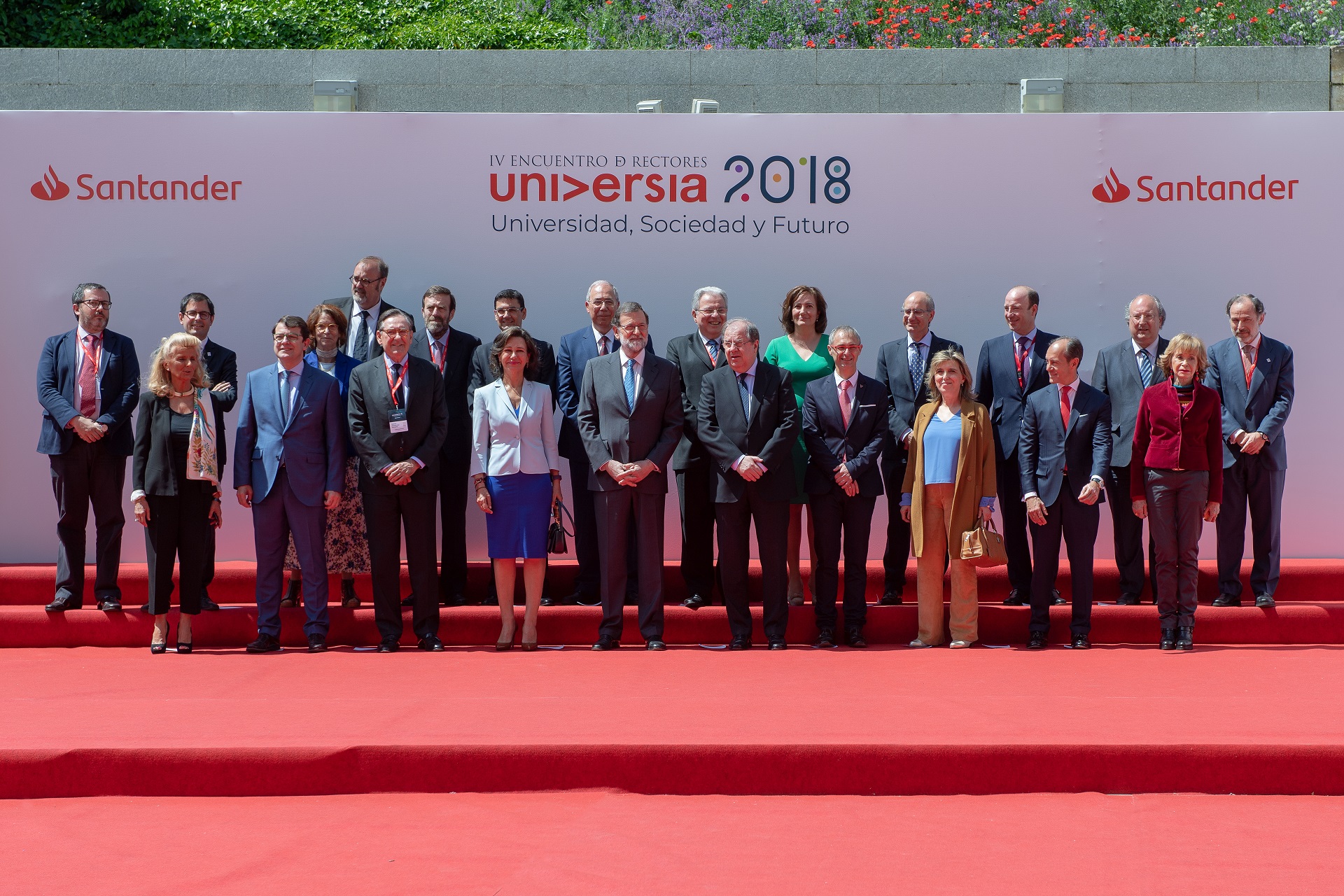His Majesty the King of Spain and the president of Portugal today presided over the opening ceremony of the Universia IV International Rectors’ Meeting, which was attended by 600 rectors from 26 countries representing 10 million students worldwide.
Ana Botín: “I believe in a higher education that always involves humanist, transversal and multidisciplinary teaching. In universities that are a source of innovation, critical thinking and social awareness.”
Ana Botín: “We should view universities as part of the solution for training global citizens, by preventing excessively local and inward-looking views that distance us from international cooperation.”
Ana Botín: “Excellence should be inclusive and contribute to general interest and equity”.
Salamanca, 21 May 2018.
His Majesty the King of Spain and the president of Portugal, Marcelo Rebelo de Sousa, presided over the opening ceremony of the Universia IV International Rectors' Meeting held today in Salamanca. Also in attendance at this event were the Ibero-American Secretariat General, Rebeca Grynspan, the Secretary General of the OECD, Ángel Gurría, the Spanish Minister of Education, Culture and Sport, Íñigo Méndez de Vigo, the president of Castile and Leon, Juan Vicente Herrera, and the chairman of Universia and Banco Santander, Ana Botín.
The Universia IV International Rectors' Meeting, at which 600 rectors from 26 countries who represent 10 million university students worldwide are taking part, is hosting a debate with the theme “University, Society and Future”. The attendees will focus on key issues facing universities currently and in the immediate future: “Training and learning in a digital world”; “Research at universities: a paradigm under scrutiny?” and “The university's contribution to social and territorial development”.
In her keynote address, the chairman of Universia and Banco Santander, Ana Botín, recalled that each generation, “re-writes the social contract that regulates the relationships between the university and the society it serves”, a contract that “includes the contributions made to teaching, research and, increasingly, to innovation and entrepreneurship”. She added that “one of the functions of university education should be to teach how to learn, that is, to offer the tools that will allow the students of today to develop the new skills they need for the future”.
Convinced that “education isn't everything, but it’s almost everything. Education transforms us: personally, emotionally, culturally and, of course, financially,” Ana Botín proposed three reflections:
- “Education is essential for building more inclusive, prosperous and resilient societies.”
- The relationship between professor and student is increasingly mediated by technology, placing students at the centre of our activity. The digital revolution “is a powerful driving force for economic, social, political and cultural change”.
- A university’s key role in promoting personal growth and social mobility. “Our universities show us that knowledge, science and human experience have no borders. We should also view universities as part of the solution for training global citizens, by preventing excessively local and inward-looking views that distance us from international cooperation.”
Ana Botín stated that “all of this cannot be at the expense of neglecting the less fortunate members of our society. We must promote an open higher education that promotes universal values, tolerance and social inclusion”, with “humanist, transversal and multidisciplinary teaching”, and a “university that is a source of innovation, critical thinking and social awareness”.

Ms Botín recalled that the “Río Charter”, which contained the conclusions of the Universia III International Rectors' Meeting, laid some of the foundations for making the university of the future a reality: the importance of university autonomy, of an institutional framework that provides for alternative governance options, tailored to circumstances, vocation and capacities of each institution. To these three lines of action, the chairman of Universia added that, “the university system should aspire to generating excellence” that “should be inclusive and contribute to general interest and equity”.
The conclusions of the debate will be embodied in the “Salamanca Declaration”, which will be announced tomorrow, with the commitment by the authorities in attendance for universities to progress, through specific initiatives, in line with the needs of twenty-first century society. The closing ceremony will include an address by the president of the Spanish government, Mariano Rajoy.
The Salamanca meeting continues on from those held in Rio de Janeiro, Brazil (2014), Guadalajara, Mexico (2010) and Seville, Spain (2005). These meetings are backed by Banco Santander, the worlds’ largest corporate investor in support for education (Varkey/UNESCO- Fortune 500 Report), which has approximately 1,300 cooperation agreements with universities and academic institutions from 21 countries through Santander Universities (www.santander.com/universidades) and provides a network for more than 1,300 Ibero- American academic institutions through Universia (www.universia.net).



























